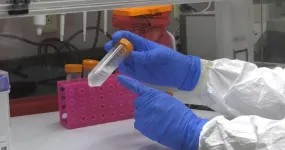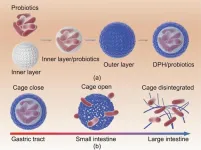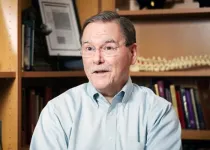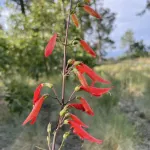(Press-News.org) UNIVERSITY PARK, Pa. — Every person hosts trillions of microorganisms, like bacteria and viruses, on their skin and in organs including those that make up the digestive tract, like their mouth, that collectively make up their microbiome. Microbiome research can lead to medical breakthroughs to treat diseases like inflammatory bowel syndrome and diabetes. According to Laura Weyrich, associate professor of anthropology and bioethics at Penn State, microbiome samples from Indigenous communities have played an important role in furthering Western medicine, but those same communities often have been excluded from the research process and may miss out on the benefits that result from their contributions to science.
Two perspectives pieces published today (Sept. 28) in Nature Microbiology by an international team, including Weyrich, of non-Indigenous and Indigenous researchers look to rectify the issue. The articles, linked by focus in the questions below, lay out a framework for ethical microbiome research practices that include Indigenous communities and ensure that these communities reap the benefits from their contributions.
Weyrich; Weyrich’s former graduate student Matilda Handsley-Davis, R&D communications specialist at Mærsk Mc-Kinney Møller Center for Zero Carbon Shipping; and Alyssa Bader, who is Tsimshian and an assistant professor of anthropology at McGill University, discussed their research guidelines and why iIndigenous communities should have ownership of their microbiome samples.
Q: Why are researchers interested in studying Indigenous microbiomes?
Weyrich: The single biggest factor that drives global microbiome differences is whether or not someone lives in an industrialized country. Industrialized microbiomes are now linked to many chronic diseases, such as obesity, diabetes and rheumatoid arthritis. Today, microbiome researchers hope that Indigenous peoples’ microbiomes — as a proxy for non-industrialized microbiomes — may provide new solutions to widespread chronic disease. Sometimes these are diseases that don’t impact all Indigenous communities, which can result in an extractive process, where researchers are getting samples and information from Indigenous communities to solve problems that don’t impact Indigenous people. The research needs to be equitable and beneficial for all involved.
Bader: The microbiomes of Indigenous people have increasingly been used as a point of comparison to study industrialized populations, particularly to understand how factors like diet and our environment have influenced the composition and function of our microbiome, with consequences for our health. Microbes associated with Indigenous peoples have been framed as valuable resources to restore lost microbial diversity and treat chronic disease in industrialized populations, but these research directions often do not center the research needs or interests of the Indigenous communities that researchers rely on for microbiome data.
Handsley-Davis: There are several reasons, but I think one of the biggest drivers is the increasing popularity of the idea that understanding Indigenous peoples’ microbiomes will somehow help to solve chronic health problems that are widespread in the industrialized world. Another reason could be a desire to better understand health problems that affect Indigenous communities and that may be linked to the microbiome.
Q: In one of the papers you introduce “microbiome ownership” as an ethical concept. What is microbiome ownership, and why is it important?
Weyrich: This means that someone could own or have rights to their own bacteria. The ‘next generation’ of probiotics to support health are coming from people who donate their microbes — not yogurts or fermented foods, so establishing a framework for people to own their microbes means that they could benefit or profit from the commercialization of these microbes. This framework is important for providing equal benefits for research participants, research teams and companies that may want to commercialize someone’s microbes to make ‘next generation’ probiotics.
Handsley-Davis: These discussions about ownership are really important because who is seen to ‘own’ a microbial community plays a huge role in determining who receives both commercial and non-commercial benefits from microbiome research. At the moment, we see a lot of benefit going to non-Indigenous researchers and companies. Part of the promise we see in microbiome ownership as a concept is to help rebalance this pattern, protect Indigenous microbiomes from exploitation and ensure that Indigenous communities get meaningful benefits from research on their own microbes.
Q: What are some of the best practices that researchers can follow when working with Indigenous communities in microbiome research?
Weyrich: A mentor of mine once suggested that I should approach communities by asking, “What can I do to be of service?” rather than going into a community and asking if they will help with my research. Research requires building meaningful relationships with communities, and that also means understanding how you can be a contributing, respected member of that community. Our paper provides a starting point for researchers wanting to work in this space.
Bader: Research with Indigenous communities should be deeply collaborative, which means researchers work with communities as research partners. In this research partnership, it’s critical that researchers uphold Indigenous sovereignty throughout the research process. This includes ensuring Indigenous community partners have a central role in developing research questions, establishing protocols for research consent and data management, and interpreting and communicating results.
Handsley-Davis: Keep an open mind and put in the time to understand and honor community perspectives and priorities. Be prepared to step outside your own culturally specific understanding. It’s also important to openly discuss the risks and benefits of a research project and agree on how they will be shared early on.
Q: In your paper, you also discuss the concept of relationality. What is it and how does it apply to microbiome research?
Bader: Relationality is the idea that we are interconnected with each other and our world. With this relationship comes the responsibility to act with care and respect. We use relationality as a framework to emphasize how humans, our microbes and our environment exist in relationship with each other, and our research ethics must recognize this relationship. When scientists study the microbiomes of Indigenous peoples, they aren’t just studying microbes, but also engaging with Indigenous communities living alongside these microbes. Microbiome scientists need to consider how to enter a research relationship with both Indigenous peoples and their microbes respectfully.
Weyrich: Our papers center relationality in many ways, focusing on the linkages between researchers and communities, as well as the relationship between people and their microbes. We urge researchers to build and appreciate these relationships in their research to reduce potential harms and expand the potential of what is possible today in microbiome research.
Q: How can the concepts and guidelines that you put forward benefit everyone?
Weyrich: While this framework was developed alongside Indigenous colleagues and is centered around working with Indigenous communities, its relevance is much farther reaching. Community centered approaches with shared benefits for researchers and communities should be a foundational tenet of any research program. I sincerely hope that teams doing field research will integrate some of these tenets into their programs so that scientists can do research that is impactful at all levels.
Handsley-Davis: In the concepts and guidelines that are laid out in these two papers, we can see microbiome research actually take the lead in establishing ethical research partnerships and benefit-sharing with Indigenous communities. As we say in one of the papers, we see an opportunity here for researchers in this field to avoid the mistakes of the past.
END
Indigenous community-first approach to more ethical microbiome research
2023-09-28
ELSE PRESS RELEASES FROM THIS DATE:
How parents’ work stress affects family mealtimes and children’s development
2023-09-28
URBANA, Ill. – Family mealtimes are important for parents and children as a space to communicate, socialize, and build attachment relationships. But it can be difficult for busy parents to balance family and work life. A new study from the University of Illinois Urbana-Champaign explores how parents’ job stress influences their attendance at family mealtimes, and in turn, children’s socioemotional development.
“We all struggle to maintain the balance between work life and family life. But this might ...
Walking more than five flights of stairs a day can cut risk of heart disease by 20%, study says
2023-09-28
Forget walking 10,000 steps a day. Taking at least 50 steps climbing stairs each day could significantly slash your risk of heart disease, according to a new study from Tulane University.
The study, published in Atherosclerosis, found that climbing more than five flights of stairs daily could reduce risk of cardiovascular disease by 20%.
Atherosclerotic cardiovascular disease (ASCVD) along with coronary artery disease and stroke are the leading causes of morbidity and mortality worldwide.
“Short bursts of high-intensity stair climbing are a time-efficient ...
Global team recommends ethical rules for human research in commercial spaceflight
2023-09-28
The first ethical framework for conducting human research on commercial spaceflight was proposed today in an article in Science by an international team that included Hastings Center president Vardit Ravitsky. Ravitsky’s contribution focused on promoting diversity among the researchers and participants, which is essential to ensuring the research benefits society at large.
Human research on commercial spaceflight is expected to expand significantly in the near future, and yet there are no rules for ...
Ultrasound may rid groundwater of toxic ‘forever chemicals’
2023-09-28
COLUMBUS, Ohio – New research suggests that ultrasound may have potential in treating a group of harmful chemicals known as PFAS to eliminate them from contaminated groundwater.
Invented nearly a century ago, per- and poly-fluoroalkyl substances, also known as “forever chemicals,” were once widely used to create products such as cookware, waterproof clothing and personal care items. Today, scientists understand that exposure to PFAS can cause a number of human health issues such as birth defects and cancer. But because the bonds inside these chemicals don’t break down easily, they’re notoriously ...
Intravenous immunoglobulin may prevent severe infections associated with anti-BCMA therapy for multiple myeloma
2023-09-28
Bottom Line: Intravenous immunoglobulin (IVIg) reduced the risk of severe infections by 90% in patients with multiple myeloma undergoing treatment with an anti-BCMA bispecific antibody.
Journal in Which the Study was Published: Blood Cancer Discovery, a journal of the American Association for Cancer Research (AACR)
Author: Guido Lancman, MD, a clinical associate at the Princess Margaret Cancer Centre of the University Health Network and an adjunct assistant professor at the University of Toronto
Background: Bispecific antibodies targeting the BCMA ...
Innovative double-layer polysaccharide hydrogel revolutionizes intestine-targeted oral delivery of probiotics
2023-09-28
In a groundbreaking study, a research team led by Changhu Xue and Xiangzhao Mao from the Ocean University of China has developed a remarkable double-layer polysaccharide hydrogel (DPH) that promises to revolutionize the field of intestine-targeted oral delivery of probiotics. The team’s findings, published in Engineering, demonstrate the potential of DPH to enhance the bioavailability, intestinal colonization, and overall effectiveness of probiotics in treating various diseases.
The research team’s study focused on addressing the challenges posed by the harsh gastrointestinal environment and the short retention ...
Ethics rules needed for human research on commercial spaceflights, panel says
2023-09-28
New guidelines are needed to assure that research on human subjects performed on commercial spaceflights is conducted ethically, a panel of experts say in a commentary appearing in the September 28 issue of the journal Science.
Their paper is titled Ethically cleared to launch?
Private companies are expected to fly thousands of people into space in the coming decades. Those aboard will include workers and passengers who will have the opportunity to participate in research studies. Such research is not only essential to assure the safety of future space travelers but often also addresses critical issues of human health in general.
Buț ...
A few essential genetic differences tailor flowers to bee or hummingbird pollinators
2023-09-28
Large differences in flower characteristics between wildflowers with different pollinators are achieved by a few key genetic differences, according to a study by Carolyn Wessinger at the University of South Carolina, US, and colleagues, publishing September 28th in the open access journal PLOS Biology.
Plants that rely on animal pollinators, such as insects or birds, have evolved distinctive suites of flower characteristics — known as “pollination syndromes” — that are tailored to the pollinator. For example, most plants in the ...
Dartmouth study removes human bias from debate over dinosaurs' demise
2023-09-28
To help resolve the scientific debate over whether it was a giant asteroid or volcanic eruptions that wiped out the dinosaurs and most other species 66 million years ago, Dartmouth researchers tried a new approach — they removed scientists from the debate and let the computers decide.
The researchers report in the journal Science a new modeling method powered by interconnected processors that can work through reams of geological and climate data without human input. They tasked nearly 130 processors with analyzing the fossil record in reverse to pinpoint the events and conditions that led to the Cretaceous–Paleogene (K–Pg) extinction event that ...
Cleared to launch? Ethical guidelines needed for human research in commercial spaceflight
2023-09-28
HOUSTON – (Sept. 28, 2023) – The commercial spaceflight industry is expanding opportunities for scientific research in space, but the industry needs clear ethical guidelines before human research is ready for liftoff. In a new policy paper published in Science, a global, multidisciplinary team of bioethicists, health policy experts, space health researchers, commercial spaceflight professionals and government regulators outlines potential ethical concerns facing the future of commercial space research and provides guiding principles ...




